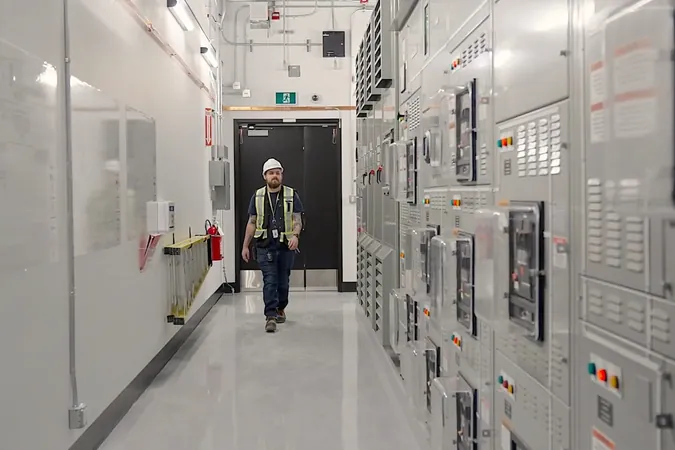
Canada Set to Unleash Its Might with a New Mega Data Centre in Alberta
2024-12-31
Author: William
Overview of the New Data Centre
In an exciting development for Alberta's tech landscape, eStruxture Data Centers, a leading name in the data centre industry, has announced plans to construct its largest facility yet in the province, marking a significant step towards transforming Alberta into a critical hub for data infrastructure. Scheduled to be operational by fall 2026, this ambitious $750-million project will boast an impressive capacity of 90 megawatts (MW), making it one of Canada's most powerful data centres.
Located near Calgary, eStruxture's latest venture, referred to as CAL-3, will add to the company's growing portfolio in Alberta, signaling a bold investment in the region. The Montreal-based company currently operates 12 data centres across major markets, including Montreal, Toronto, and Vancouver. Chairman Todd Coleman articulated this ambitious move: "Our business wasn’t built by waiting but by leading from the front."
The Surge in Data Demand
The necessity for robust data centre infrastructure is skyrocketing, driven largely by advancements in artificial intelligence (AI). New data centres are increasingly power-hungry, with applications such as ChatGPT using 10 times more energy than a standard internet search. Currently, a majority of Canada’s 239 data centres, including 22 in Alberta, provide under 20 MW of power. The introduction of CAL-3 promises to significantly boost local data capacity, bringing eStruxture’s total to 125 MW in Calgary alone – enough energy to sustain approximately 100,000 homes or the entirety of Thunder Bay.
Coleman emphasizes the growing addiction to data, stating, "We are super-addicted to data, and it’s just multiplying." His observations highlight Alberta's advantages, including ample land, high-speed connectivity, and dependable energy resources - essential components for the future of data processing.
Alberta’s Innovative Infrastructure Push
Alberta is making considerable strides in positioning itself as a prominent innovation hub. The province has recently unveiled a new data centre attraction strategy aimed at reducing bureaucratic obstacles and fostering a business-friendly environment, with a vision to become North America’s preferred choice for AI data centres.
Minister of Technology and Innovation, Nate Glubish, highlighted Alberta's potential, boasting of an affordable and reliable natural gas supply. He stated that the province could potentially attract an impressive $100 billion in investments over the next five years.
Furthermore, the increasing capacity of Alberta’s energy generation, which reached 16,024 MW in 2021, presents a competitive advantage for data centre operations. A significant portion of Alberta’s energy mix comes from fossil fuels (81%), while renewable sources like wind and solar are progressively integrating into the grid.
Riding the Data Centre Boom
As the demand for data centres mounts, CBRE reports a staggering 70% increase in North American data centre construction since 2023, with vacancy rates plummeting to a historic low of 2.8%. This surge signals an undeniable market shift, where lease rates have risen by 45% since 2021, averaging $174.06 per kilowatt per month.
Looking ahead, Alberta's burgeoning tech ecosystem may become a beacon for new investments, with plans for up to 30 additional data centres across Canada. If realized, these facilities could represent a substantial 14% of Canada’s total energy consumption by 2030.
One notable proposal includes Canadian entrepreneur and television personality Kevin O'Leary’s ambition to create the world's largest AI data centre, estimated to cost over $70 billion and located near Grand Prairie. If materialized, this facility could offer a staggering 7.5 gigawatts of capacity.
Carbon Capture Initiatives: Ensuring Sustainability
To address environmental concerns related to energy use, the Alberta government actively supports carbon capture technologies. Companies like Calgary-based Entropy Inc. are pioneering efforts in carbon capture and storage, significantly reducing greenhouse gas emissions while enabling the use of natural gas. The company's projects are a testament to Alberta's commitment to marrying energy production with climate responsibility.
Conclusion
In conclusion, Alberta's bold moves to attract data centres underline the province's readiness to become a powerhouse in the digital economy. With promising investments and innovative strategies in the pipeline, Alberta is indeed on the brink of a data renaissance. Will it succeed in becoming the ultimate destination for data centres in North America? Time will tell.









 Brasil (PT)
Brasil (PT)
 Canada (EN)
Canada (EN)
 Chile (ES)
Chile (ES)
 Česko (CS)
Česko (CS)
 대한민국 (KO)
대한민국 (KO)
 España (ES)
España (ES)
 France (FR)
France (FR)
 Hong Kong (EN)
Hong Kong (EN)
 Italia (IT)
Italia (IT)
 日本 (JA)
日本 (JA)
 Magyarország (HU)
Magyarország (HU)
 Norge (NO)
Norge (NO)
 Polska (PL)
Polska (PL)
 Schweiz (DE)
Schweiz (DE)
 Singapore (EN)
Singapore (EN)
 Sverige (SV)
Sverige (SV)
 Suomi (FI)
Suomi (FI)
 Türkiye (TR)
Türkiye (TR)
 الإمارات العربية المتحدة (AR)
الإمارات العربية المتحدة (AR)